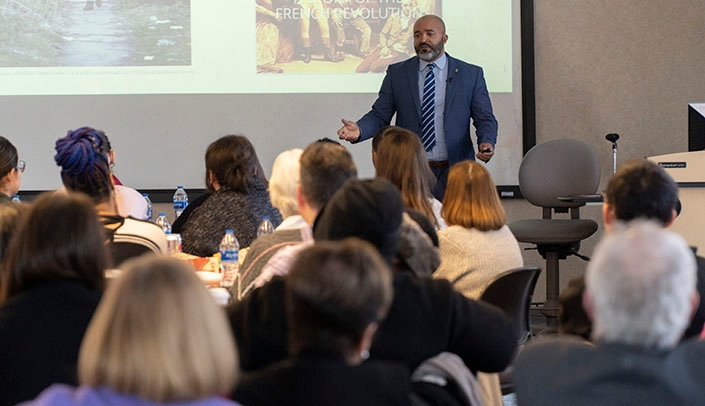Nothing worth having comes easy — including change.
A capacity room in lower Storz Pavilion at Clarkson Tower honored the life of Rev. Dr. Martin Luther King Jr., while listening to a message of how the economy plays a role in fulfilling his visions.
The annual program in the civil rights leader’s honor was held Jan. 20. The keynote speaker this year was Dell Gines, senior community development adviser, Federal Reserve Bank of Kansas City – Omaha branch.
Gines’ presentation was framed around Dr. King’s quote, “The ultimate measure of a man is not where he stands in moments of comfort and convenience, but where he stands at times of challenge and controversy.”
“You cannot create change that is comfortable,” Gines said to the audience. “Things change the way we shape them to or they change organically as things happen in society.”
Gines spoke to the role the economy plays in society and creating impoverished individuals. He noted that beyond the infamous “I have a dream.” speech, Dr. King was interested in poverty and the economy.
“Before he was assassinated, I think he was trying to evolve past ‘I have a dream . . .’ to create a vision that would ultimately lead to a plan that would create real change.”
The change is still a work in progress.
Gines noted that since the time of Dr. King’s death, the wealth gap between Caucasians and African-Americans has remained unchanged.
“We’ve been doing a whole lot of dreaming and not a lot of changing,” Gines said.
How does the change occur?
“You have to look at things innovatively,” Gines said. “We have to create more creators of jobs and less consumers of jobs.”
In short, Gines said there has to be a disruption to the way things have been done.
“It’s easy to say, ‘I have a dream.’ It’s easy to say, ‘racially equality,’ but it’s a lot harder when you have legacy systems in place with people who prefer to have it one way even when on the surface they will tell you something else,’ he said.
Gines added that organizations like UNMC and Nebraska Medicine could take the lead and come up with innovation disruption, strategic change, and ways to relook at the world in unique ways to get to better outcomes for everybody.
“We can bridge the gap between the haves and have nots,” Gines said. “There’s nothing new about poverty. What’s new is the technology and techniques we have today.”
Gines concluded his presentation challenging the audience to whether they had the will to make that change occur.
“Do you have the will to make yourself uncomfortable? Do you have the will to create disruptive systems?” Gines asked. “Do you have the will to come out of your silos and look at how things are connected? Do you have the will to truly execute the dream that everyone wants to celebrate?”
He continued, “”we live in an era now where we can look at the world differently, come together differently, reorganize ourselves in a better way to get to the outcomes Dr. King wanted.”
